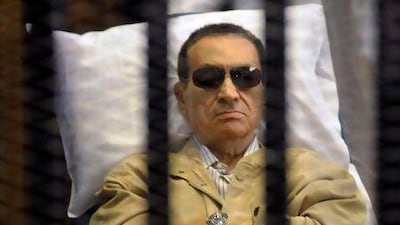CAIRO // Hosni Mubarak and his top police officials will go on trial on Saturday for the second time accused of complicity in the murder of protesters during the uprising that unseated him.
The retrial comes amid a growing feeling among Egyptians that the achievements of the 2011 uprising are slipping away.
When Mubarak and Habib Al Adly, the former minister of interior, were sentenced to life in prison last June for their involvement in the killing of protesters, there was a sense that a modicum of justice had been served.
Even as the economy was beginning to crater and a new force, the Muslim Brotherhood, was rising to power, the verdict was something clear: the former ruler was guilty.
But in the ruling, neither Mubarak nor El Adly were found guilty of ordering the killing of protesters. Instead, they were convicted on a more ambiguous charge of failing to prevent them.
In the same trial, charges of corruption related to the Mubarak family receiving villas in exchange for political favours were thrown out because the statute of limitations had expired. And six other interior ministry officials were acquitted of all charges.
In January, Egypt's highest appeals court overturned the convictions and announced a retrial citing procedural errors.
Today - 802 days since the 2011 uprising started in Tahrir Square - Mubarak, El Adly and the other defendants will return to court where a new panel of judges will start the case from the beginning.
Mubarak's legal team is worried about the possibility of a fair trial, according to Yousry Abdel Razek, a lawyer who has worked on Mubarak's defence.
"We have faith in justice in Egypt, but we don't trust the Muslim Brotherhood-appointed prosecutor," he said.
Whether new evidence will be introduced in the case - including details from an 800-page report from a panel of lawyers and officials about state violence against Egyptians that led to the death of more than 900 people - is not yet clear.
"I have a lot of doubts about the possibility of a fair trial," said Mohsen Bahnasy, a human rights lawyer and member of the steering committee of the commission that wrote the report. "Justice is falling away in Egypt all the time."
The public prosecution's office had not yet finished its investigations of the report, which detail allegations that the police and military used live weapons against Egyptians who protested against Mubarak's regime two years ago. Mr Bahnasy said that meant the report would likely not be admitted as evidence.
Egypt's President Mohammed Morsi and the military have closed ranks to deny charges that soldiers had killed and tortured protesters.
Col Gen Abdel Fattah Al Sissi, the defence minister and army chief, defended the military yesterday.
"The armed forces did not kill nor order killings; it did not act treacherously, nor did it order treachery," he said.
Mr Morsi also praised the armed forces for "protecting Egypt" during the uprising.
Back in June last year when Mubarak and El Adly were sentenced, many Egyptians erupted in joy as Judge Ahmed Refaat finished a 15-minute televised speech, where he described the "black, black, black" years under Mubarak's autocratic regime.
But lawyers immediately saw the potential for a retrial. The legal reasoning of the conviction was thin and no powerful evidence had emerged that Mubarak was aware of the full extent of the brutality unleashed by the police in the streets during the 18 days of protest.
Many other businessmen and officials connected to the old regime have had their convictions overturned this year, too.
The retrial will once again highlight Mr Morsi's fractious relationship with Egypt's judiciary.
The unilateral appointment of prosecutor general, Talaat Ibrahim, by Mr Morsi last November sparked huge protests in Egypt and a strike by hundreds of judges who said the president had infringed on the powers of the judicial branch. A court ordered his predecessor reinstated earlier this month, but Mr Ibrahim has managed to stay in place.
Mr Ibrahim this month accepted a raft of charges against comedian Bassem Youssef for defamation of the president and Islam.
bhope@thenational.ae

